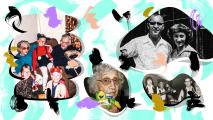Longevity researchers aren’t just on the cusp of extending the number of years people live. They’re also discovering ways to prevent and treat the physical ailments and neurodegenerative diseases that often come with age. In this collection of features, essays, and op-eds, Freethink maps the frontier — from lab breakthroughs to clinical trials and the startups scaling them — separating hype from evidence, while also exploring some of the philosophical and ethical questions surrounding the longevity movement. We hope you enjoy.

“The first longevity medicines could be approved in time for most people alive today — maybe even in the next five years, if we get serious about the science.”
Andrew Steele
“Dogs are a great model of human aging. If something works in a dog … it’s pretty compelling evidence that it might also work in a human.”
Celine Halioua
“I’m just brimming with optimism because I know we can do this. We can flip the elderly from being the ‘illderly’ to the ‘wellderly.’”
Eric Topol
















